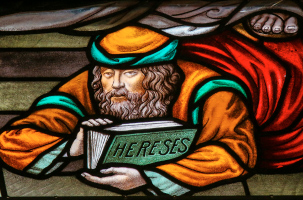 The people who have kept the world from a slide into darkness and pulled it forward have nearly always been heretics of one form or another.
The people who have kept the world from a slide into darkness and pulled it forward have nearly always been heretics of one form or another.
I’m using “heretic” beyond a religious context, but that shouldn’t be unusual, after all, it’s the punisher who makes the heretic. Without punishers, heretics would be no more than people with different ideas. And in our time, the punishers are seldom religious.
Trace almost any productive development back to its source, and you are likely to find an originator who was anything but obedient and conforming. I know, because I’ve done it.
Let me give you an example. Greek philosophy traces back through the names people know (Socrates, Plato, Aristotle) to earlier philosophers (Pythagoras, etc.), then to still earlier philosophers, finally ending with Thales in the 7th century BC. But Thales wasn’t really Greek. Rather, he was a Phoenician, minimally half-Phoenician… and the Phoenicians were Semitic traders. They were clearly not respectable types to the Greeks. Plato wrote (in his Laws) that they had developed skills in trickery rather than wisdom.
The point here is that heresy – thinking differently – is the starting point for progress. Obedience, on the other hand, renders humans inert, leaving the heretics to do most the heavy lifting. And, truth be told, obedience also leaves the heretics to do most of the really fun things.
Who Said That?
Let me give you two quotes, and afterward I’ll tell you who said them. Here’s the first, supporting the contention of our title:
The hope of a secure and livable world lies with disciplined nonconformists, who are dedicated to justice, peace, and brotherhood. The trailblazers in human, academic, scientific, and religious freedom have always been nonconformists. In any cause that concerns the progress of mankind, put your faith in the nonconformist!
And here’s the second, explaining how heresy is often a badge of honor:
I think all the heretics I have known have been virtuous men.
They have the virtue of fortitude, or they could not venture to own their heresy; and they cannot afford to be deficient in any of the other virtues, as that would give advantage to their many enemies; and they have not, like orthodox sinners, such a number of friends to excuse or justify them.
Do not, however, mistake me. It is not to my good friend’s heresy that I impute his honesty. On the contrary, ’tis his honesty that has brought upon him the character of a heretic.
The first quote comes from Dr. Martin Luther King Jr. in his book Strength to Love. The second quote comes from Benjamin Franklin, in a letter he wrote to Benjamin Vaughan, October 24, 1788.
Surprised?
People who pay attention, you see, tend to notice these things. And here’s another, from author Leonard Woolf, talking about the years in which he and his friends were in the heretic camp:
We were not part of a negative movement of destruction against the past: We were out to construct something new; we were in the van of builders of a new society which should be free, rational, civilized, pursuing truth and beauty. It was all tremendously exhilarating.
And such things are exhilarating! The obedient are cut-off from that level of passion: By obeying, they bypass their own will. To obey is to short-cut your inner processes… the processes that make you truly alive.
To whatever extent we engage in simple obedience, we are that much less alive.
What Heretics Have and the Obedient Don’t
Those who merely follow the flow, whether they be doctors or ditch-diggers, live by rules and slogans that are provided to them by others. And with that type of fuel, they can’t develop much internal horsepower.
The heretic, on the other hand, survives by forming and possessing a clear, self-generated, and compelling vision of human progress. And this is the thing that moves humanity forward. The Bible was ever so right in saying that “with no vision, the people perish,” and it is the heretic that keeps compelling visions alive.
One last quote, from Frederick Hayek (from Studies in Philosophy, Politics and Economics). This is what heretics do, but the obedient do not:
We must make the building of a free society once more an intellectual adventure, a deed of courage. What we lack is a liberal utopia… a truly liberal radicalism which does not spare the susceptibilities of the mighty…
This is what the heretics of our time are developing and what the world desperately needs us to develop, whether it knows it or not.
**
Paul Rosenberg
freemansperspective.com
